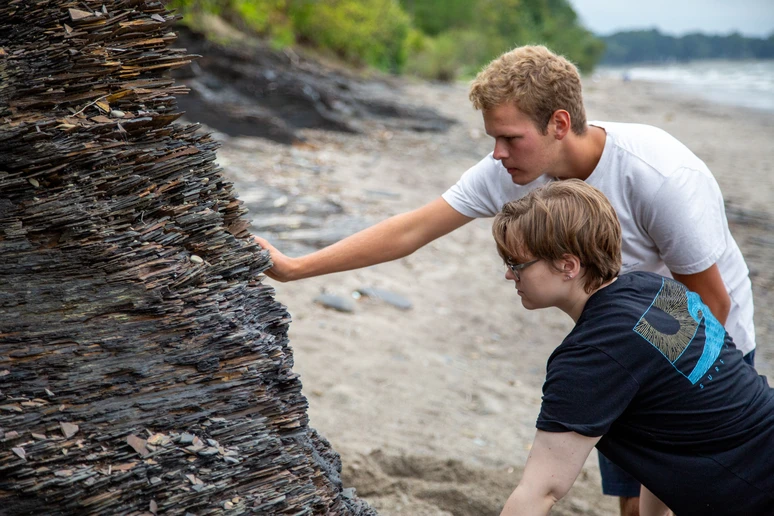



Geology is the scientific study of Earth's structure, composition, processes, and history. It delves into various aspects of our planet, examining rocks, minerals, and the forces that shape landscapes and ecosystems. By exploring geology, we uncover crucial insights into natural resources, environmental changes, and geological hazards. This comprehensive field equips individuals with the knowledge and skills necessary to understand Earth's complexities, offering a gateway to diverse career paths in resource management, environmental science, and earth history.
Earth's structure comprises the crust, mantle, outer core, and inner core. The crust includes land and ocean basins, while the mantle is semi-solid and dynamic. Understanding these layers is essential for comprehending geological activities such as earthquakes and volcanic eruptions, with geologists mapping this structure to reveal the processes affecting our environment.
Geology—also referred to as Earth Science—is vital for predicting seismic activity through plate tectonics and understanding the formation of natural resources crucial for human development. Additionally, it informs environmental conservation efforts by analyzing soil composition and land use, highlighting its importance in addressing climate change challenges. Overall, geology enhances our knowledge of Earth and is key to promoting sustainable practices for the future.

Geology is the study of Earth—its materials, history, and the dynamic processes that shape our planet. This section introduces three major branches of geology: materials, processes, and historical. Each offers a unique lens for understanding the natural world, from the formation of rocks and continents to the impact of human activity on Earth's systems. Together, these fields provide the foundation for solving real-world problems related to natural hazards, resource management, and environmental sustainability.
Geological Materials
Geological Processes
Historical Geology
Geology plays a vital role in addressing real-world challenges across natural resource management, engineering, and environmental conservation. By studying Earth’s materials and processes, geologists help us use resources wisely, build safely, and protect the planet.
In resource management, geology provides essential knowledge about the location, quality, and sustainability of materials like minerals, fossil fuels, and groundwater. This insight supports responsible extraction practices that meet economic demands while minimizing environmental impact.
In engineering, geological analysis ensures the safety and stability of structures. Geotechnical studies of soil, rock, and potential hazards like earthquakes guide the design and construction of buildings, roads, and other infrastructure.
Geology also informs environmental conservation by revealing how natural processes affect ecosystems and identifying areas at risk of erosion, pollution, or habitat loss. These insights support efforts to protect biodiversity and promote sustainable land use.
Together, these applications show how geology contributes to solving some of society’s most pressing challenges—helping us build a safer, more sustainable future.
Understanding geological time scales is crucial for comprehending Earth's vast history. Geologists divide Earth's history into distinct intervals called geological time scales, which frame sequences and durations of significant events. The primary divisions include eons, eras, periods, epochs, and ages. Each level represents a different timeframe, ranging from billions to millions of years, enabling scientists to track the evolution of life and geological changes over time.
Geological Time Scale
Key Events in Earth's History
Dating Earth’s Past
Geology not only helps decipher our planet's history but also equips us with the knowledge to address contemporary issues such as climate change, resource management, and environmental preservation. Studying geological time scales, significant events on Earth, and methods of dating rocks and fossils are foundational components of this field. As we continue exploring geology, we gain valuable insights into the natural world, reinforcing the importance of this science in both historical context and modern application.
Geologists play a crucial role in understanding Earth and its processes, contributing significantly to fields such as environmental science, resource management, and hazard assessment. Careers in geology span diverse specializations, offering a variety of tasks based on expertise.
Many geologists work in exploration, searching for resources like oil, gas, minerals, and groundwater. This involves field studies, sample collection, and geological data analysis to determine the viability of resource extraction. Others focus on environmental geology, assessing and mitigating the impacts of human activity on Earth. This may include studying soil contamination, conducting environmental impact assessments, or developing sustainable land-use strategies.
Increasingly important is fluency with geographic information systems software (GIS) to organize and map data.
Geologists may also work in academia, conducting research and teaching future geoscientists. Research geologists often work on projects aimed at better understanding fundamental processes, such as plate tectonics, vulcanism, erosion. Their work can lead to breakthroughs in understanding Earth's history and the forces that shape it.
Geologists' work environments vary widely. Many spend significant time in the field, conducting surveys and collecting data in diverse locations, from remote mountain ranges to coastal areas. Data collection can also happen in cities or towns--where ever the earth is present to study. Fieldwork can be physically demanding, involving activities like hiking to collect samples. Collecting samples may take the form of drilling into the ground to see what is beneath our feet. This hands-on experience is vital for developing a deep understanding of geological features and processes.
In contrast, some geologists work in laboratories, analyzing samples and conducting experiments to understand the composition and behavior of Earth's materials. Laboratories are often equipped with advanced technology and tools for precise measurements and analysis, allowing geologists to interpret findings and contribute to broader scientific knowledge.
Additionally, many geologists work in offices, preparing reports, collaborating with professionals, and managing projects. This often involves using computer software for modeling geological phenomena or simulating outcomes related to resource extraction or environmental change.
Overall, geology offers a wide array of career opportunities and work environments, making it an exciting field for those passionate about Earth and its processes. By pursuing a degree in geology, students prepare for rewarding careers that contribute to understanding our planet and addressing resource management challenges sustainably.